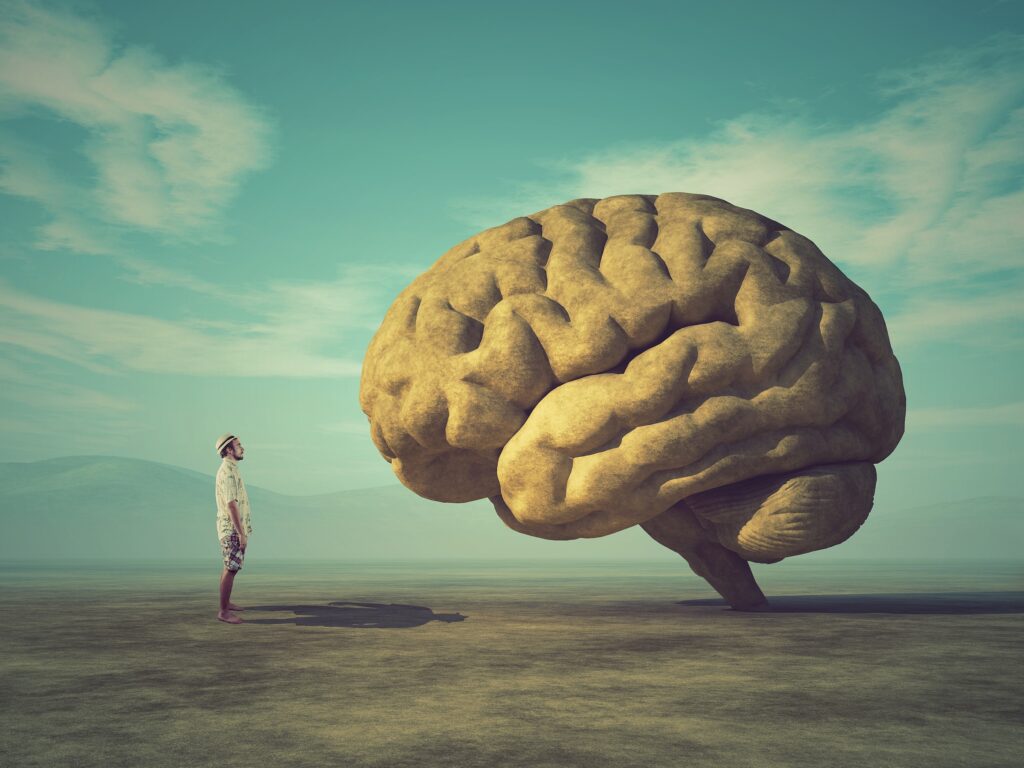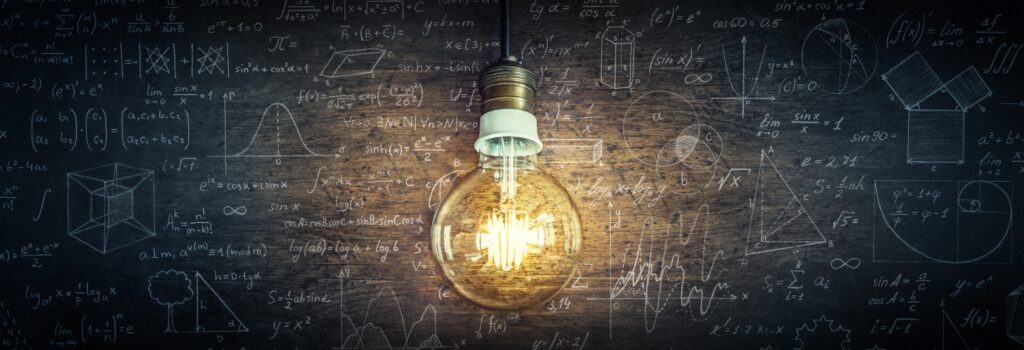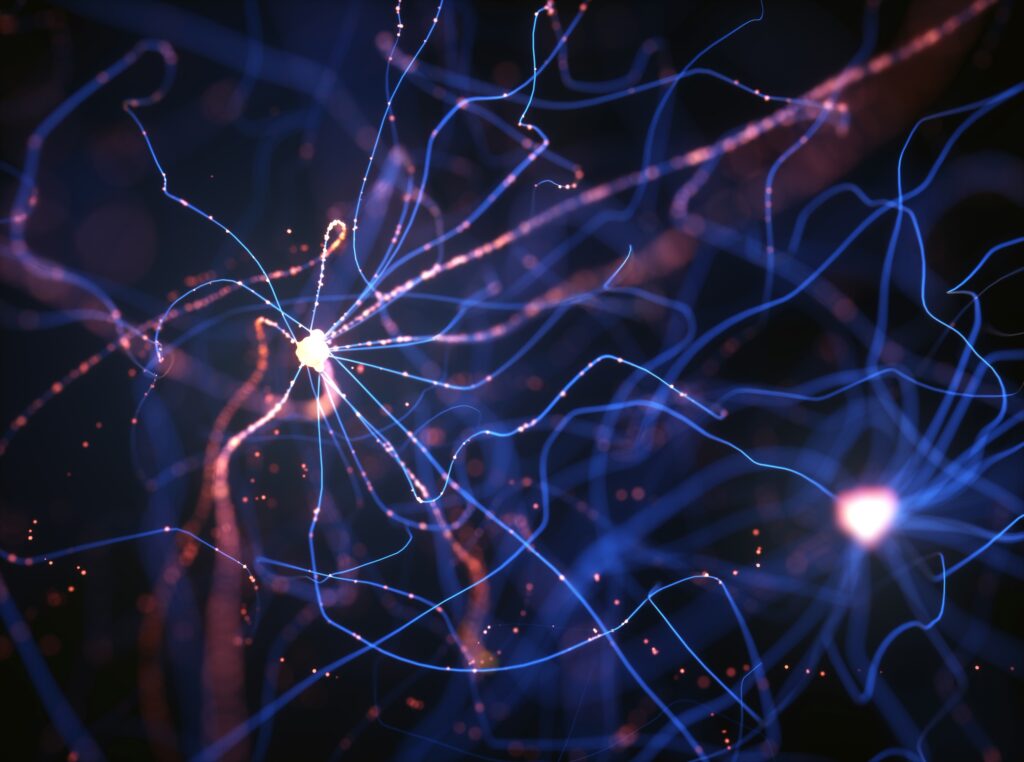How to understand your mind, beyond thought
Reading | Psychology
![]() Johannes Jörg | 2022-07-17
Johannes Jörg | 2022-07-17

The unmediated experience of where the question “what am I?” arises in our mind is already its answer, writes Johannes Jörg; an answer that cannot be produced by thought alone. To understand our own minds, we must go beyond conceptual reasoning and explore our older, more primary mental faculties. By merely being aware of our often-ignored inner states, we can restore balance to our lives. This is because living systems are self-organizing: when dysregulation comes into awareness, it is already being regulated.
The experience of the human mind is exuberantly rich. It includes thoughts, pain, boredom, hunger, depression, dreams, lust, all sorts of emotions, moral sense, and infinite shades of ever new experience. One field of mentality, however, stands out as the pretending mainstay of the human mind: thinking. Without a doubt, the faculty of thinking is symptomatic of the human condition and has a crucial part to play: It is the self-reflecting, re-representing, recursive mirror of mentality. It is at the level of thinking that questions about the nature of mind are formulated. And it is also there that thinking can be called into question: Can self-referential questions about mind be addressed in a satisfying way by thinking? Can the process of thought understand itself?
The advancing development of formal systems has revealed that any system of thought—be it semantic, logical or mathematical—runs into systematic problems if it is applied to itself. Gödel’s First Incompleteness Theorem famously proves mathematically that logically consistent and complete axiomatic systems are impossible. A non-contradictory mathematical system cannot prove its own non-contradiction [1]. There are different kinds of contradictory logical systems that are equally valid. Logic cannot prove itself logically without circularity. Strictly speaking, the axioms of logic are arbitrary. The Duhem-Quine thesis delineates any theory as a network of many interrelated propositions [2]. A complete axiomatization of complex theories turns out to be impossible. In conclusion, no theoretical understanding can possibly be built on rigorously solid ground.
As such, thinking cannot grasp itself. Apparently, understanding cannot be grounded by itself. Formal systems of understanding applied to themselves end up in the Münchhausen trilemma of either a circular argument, a regressive argument or a dogmatic argument [3]. An ultimate foundation for formal systems of understanding proves to be impossible. A system of thought can only operate within the system and cannot go outside of itself to gain a perspective on itself. It’s the system of thought that provides the perspective of speculation in the first place. If it turns back to itself, thinking naturally starts running in circles.
In hindsight, it shouldn’t strike us as a huge surprise that circular references sooner or later meet epistemological boundaries. Just like any other scientific understanding, the matter in question needs to be understood in terms of something else, to avoid circular reasoning. However, these findings are not particularly tragic. It is merely formal thinking that is epistemologically limited in relation to formal thinking. It is not necessarily thinking in general that is limited; it is not the human mind that is limited; at the end of the day, it is not even thinking that wants to understand thinking: It is the human being that wants to understand being a human being. In this quest for self-knowledge, the human being merely makes use of the faculty of thinking. So, how far can thinking reach in relation to understand being human, so to understand the human mind?
Mentality and concepts of mentality
Questions about mind arise in thought. But they do not, and did not, arise out of the blue. Thinking and its highly abstract cognitive capacities are built on more fundamental forms of mentality. This is obvious, both in an evolutionary, phylogenetic view of the species and in a developmental, ontogenetic view of the individual. No child is born with a ready-made intellect and preconceived concepts. There need to be primary mental experiences before secondary mental concepts can be abstracted from them. The distinction between primary experience and secondary concepts is all-important.
The system of thinking turns primary mental experience into secondary conceptual memories of experience. Thus, it introduces almost any experiential content into a vast system of concepts, where they can be related and reflected. Thinking then ceaselessly weaves and rearranges ever larger, denser and more entangled webs of nots and links. What makes the machinery of conceptual relationships boundless is the fact that the complexes of concepts it produces can, themselves, be re-introduced into it, turned into even richer meta-concepts, which in turn can be re-introduced again, and so on. By relating to itself and recursively re-introducing its own operations into the system, ultimately a whole secondary cosmos of incredible conceptual richness and complexity is created. And it is in this self-referentiality of thinking that the trickiness of human cognition begins [4].
When the human mind self-reflects in thought, it is not primary experience that relates to itself directly, but mental concepts that relate to mental concepts. No matter how hard one tries, whatever is reflected in thought has already been transformed into a secondary concept. The agent of self-referential thinking—the thinking “I” that navigates the processes of self-reflection—is nothing but a thought itself. The thinking “I” is merely an abstraction, not the living human being as a whole, which of course comprises immeasurably more than thought. The actual living human being can never be a content of thought. It is the other way round of course: The actual human being and its mentality include a cognitive system that is able to produce the self-referential thought of “I”. No thought and no thinking ever are the human being. The map won’t ever be the territory [5].
Self-referencial thinking
The faculty of thinking has immeasurable powers to account for the world, with one major exception when it comes to itself: Since thinking itself is part of the picture it tries to complete, it can never create a complete account of the world. Its very activity creates more content that would have to be accommodated in the picture again. The ultimate problem of thinking is thus thinking itself. But the problem obviously cannot be solved by thinking. In self-reference, every thought is the creation of a new problem and loops into infinite regress. The most central problem of thought is even fueled by thinking, or rather created by the act of thinking to start with.
The autobiographical self—the concept of “I”—that navigates self-reflective thought processes operates within a closed system of thought, inside a web of concepts [6]. It is limited to the system of thinking and cannot go beyond. Thinking can only do thinking [7]. If questions of self-knowledge are processed by thinking, there is no hope for an answer, because within thinking they are self-referential tautologies to begin with. The thought of “I” is asking itself what the thought of “I” is. The thinking “I” can never grasp itself, because every grasping is that which it tries to grasp.
Only in conjunction with other mental faculties can the human being realize and attach value to non-conceptual aspects of human mentality. Only the pressing urge of non-conceptual experiences can open up a perspective into human mentality that sees beyond the illusions of thought. To stop getting enmeshed in its own fabric, thinking must be grounded by the larger field of human mentality it is a part of [8].
Thinking is about life
As stated before, the system of thinking did not, and does not, arise out of the blue. Conceptual thinking is the latest achievement of 4 billion years of evolutionary self-organization of living systems. Thinking operates within the living system and in the service of the living system. It is an integral part of the larger system of life and cannot be understood independently from it.
Just like any other self-organizing system, thinking must be conceptualized by the mechanisms of self-organization that created the system in the first place. From an evolutionary point of view, thinking is the latest and thus least foundational cognitive function of a human being. From within thinking, life appears to be about reasoning, solving conceptual problems, truth and so on, since anything that is to enter thinking must be turned into a conceptual thought first. However, from the perspective of the living human being as a whole, the internal affairs of the system of thinking are of limited interest. The organism only cares about it to the extent that thinking contributes to the organism’s life-supporting regulatory processes.
The driving forces of thinking are the living states of the organism. Naturally, this cannot be intuited easily from the perspective of thinking. But neither is it particularly difficult to derive: If there is pain, thinking gets going to eliminate the source of pain. If there is hunger, cognitive processes get going to alleviate the hunger. If there is sexual arousal, cognition plots behavioral strategies to bring about sexual gratification. The driving forces of cognitive activity are the living states of the organism. This seems obvious with hunger, but it is also necessarily true for any cognitive activity: If there were no living state underlying the cognitive activity, there would be no mechanism of self-organization for cognitive activity to emerge in the first place [9].
Internal sensations, representing the living states of the organism, are the primary experience of aliveness. They are the very first-person perspective of the organism, the foundational realm of human mentality. Internal sensation is the bedrock of the human mind, from an experiential first-person perspective [10].
Sensing the way forward
From the perspective of the living human being as a whole, cognitive concepts are not just about other concepts, but primarily about the experiential, feeling states of the organism they are connected to. Thoughts operate in the service of the aliveness of the living system that brings them about. Therefore, the actual problems of thinking cannot be solved by thinking, as they are about something else entirely. Thinking cannot alleviate pain, hunger or sexual arousal by its own efforts. It can only contribute by plotting strategies for relief. This is obvious with hunger, but in principle none of the actual problems of thinking can be solved by thinking alone.
All this may sound like a dead end for the intellectual endeavor. But the recognition of thinking’s own limitations is the crucial breakthrough required to overcome the epistemological deadlock of self-referentiality. Indeed, comprehending the mechanisms that give rise to the quest for self-knowledge is the biggest possible achievement of conceptual thinking. It does have a prominent role to play, provided that it be accompanied by other mental faculties. Only when thinking ceases to arrogate to itself the position of supreme mental authority is it capable of surrendering to its assigned task. Only then can it cease to serve itself and begin to put its superior powers to the service of its larger purposes: the health of human organisms and societies, the promotion of life and the flourishing of ecosystems.
When thinking is not accompanied by an explicit awareness of inner states, it loses guidance from its actual motives and, therefore, wanders blindly in conceptual labyrinths. For as long as thought processes are not informed by inner sensations, they operate in a trial-and-error fashion. The resulting corrective feedback is suffering, which eventually persuades the mind to change its ways. Yet, as soon as thinking coincides with an awareness of the underlying subtleties of unease and tension that motivate cognition, the system starts to operate differently. It stops being run by secondary conceptual abstractions and focuses on primary, inner experience instead. This is how the tail-chasing dynamic—the vicious circle of self-referential thinking—is broken. Feeling our inner states has the potential to ground and settle cognitive compulsion. The unmediated experience of the origin of the question of self-knowledge is nothing other than its answer. Although a sensation can never be thought, the origin of a thought can be sensed [11].
Conceptual understanding does not decisively affect the driving mechanisms of cognition and, as such, cannot provide much actual satisfaction to the living human being. A theoretical understanding of physical tension doesn’t alter its unpleasantness. From this perspective, the quest for self-knowledge starts to become an entirely new kind of epistemological venture. It shifts from theoretical reflections towards practices of sentient exploration and a training of the capacity to feel.
Fully experiencing a sensation is tantamount to understanding the sensation. It is not necessary to reflect on pain to understand its painfulness. By the awareness of a living inner state, understanding is already achieved as an embodied state of being, which entails mechanisms of self-regulation without further ado. The living system essentially is a self-organizing system—an essentially self-understanding system, so to speak. When unconscious dysregulation comes into awareness, it is already being regulated. Sentient self-exploration increasingly builds embodied knowledge, which progressively reduces dissatisfaction, the lack of self-knowledge.
References and comments
[1] Gödel, Kurt (1931): Über formal unentscheidbare Sätze der Principia Mathematica und verwandter Systeme I, Monatshefte für Mathematik Physik 38, pp. 173–198. English translation in: van Heijenoort (1967), 596–616.
[2] Quine, Willard Van Orman (1951): Two dogmas of empiricism, The Philosophical Review, 60(1), 20–43.
[3] The term Münchhausen trilemma was coined by Hans Albert (1968): Traktat über kritische Vernunft. Mohr Siebeck, Tübingen 1968. English translation: Albert, Hans (1985): Treatise on Critical Reason, Princeton University Press, Princeton. It is a thought experiment, also known as the Agrippan trilemma, to demonstrate the theoretical impossibility of proving any truth without appealing to accepted assumptions. A justification of all knowledge must start with some knowledge (as with dogmatism), not start at all (as with infinite regress) or be a circular argument justified only by itself.
[4] The distinction between “primary experience” and “secondary conceptual abstraction” can be understood as analogous to Schopenhauer’s distinction between “will” and “representation.” Schopenhauer, Arthur (1844): Die Welt als Wille und Vorstellung, Band 1 & 2, Reclam, 677 p. English translation: Arthur Schopenhauer (1969): The world as will and representation, Courier Dover Publications, Volume I &Volume II. The term “will” is designated by Schopenhauer to refer to a blind, aimless urge to live, thought of as a primary metaphysical principle. In contrast, secondary “representations” are merely the way the world presents itself to the intellect and reasoning.
[5] Korzybski, Alfred (1933): Science and Sanity. An Introduction to Non-Aristotelian Systems and General Semantics. The International Non-Aristotelian Library Pub. Co. pp. 747–761. The Polish-American philosopher coined the phrase, “The map is not the territory,” and used it to convey the fact that conceptual models of reality and reality itself are often confused.
[6] In systems theory, a system whose operators are not determined by its environment, but instead by its own structure and organization, is considered “operationally closed.” Neural processing operates within neural processes. The neural system generates operations through the network of its own operations. Humberto R. Maturana & Francisco J. Varela (1980): Autopoiesis and Cognition – The Realization of the Living, Springer Science & Business Media, 146 p.
[7] This bottom line brings to mind Ludwig Wittgenstein (1921): Logisch-Philosophische Abhandlung, Annalen der Naturphilosophie, 14. English translation: Tractatus Logico-Philosophicus, translated by C.K. Ogden (1922). Wittgenstein concludes that language is an ineluctable condition of thinking and cannot reach beyond itself. In the preamble he anticipates his bottom line: “Whereof one cannot speak, thereof one must be silent.”
[8] Countless types of psychotherapy explicitly work with the induction of experiences that do not aim directly at conceptual understanding. For example, body-oriented psychotherapy, music therapy, art therapy, movement therapy, autogenic training, gestalt therapy, psychedelic therapy, ego state therapy, somatic experiencing, and so on.
[9] Due to its operational closure, neural processing cannot communicate with its environment. Neural processing operates within neural processes. Nevertheless, neural processing interacts causally with its environment, which are the living states of homeostatic regulation of the metabolizing organism. In systems theory this inter-systemic relationship is called “structural coupling”. Humberto R. Maturana & Francisco J. Varela (1980): Autopoiesis and Cognition – The Realization of the Living, Springer Science & Business Media, 146 p.
[10] Presently, there isn’t even a clear scientific consensus as to what exactly internal sensing (‘interoception’) is, let alone how best to measure it. But despite this shortcoming, the significance of interoception is beyond any doubt.
[11] Specific training of the awareness of subtle bodily sensations has been promoted by countless schools of introspection for ages, even though these first-person traditions are not able to substantiate their methodologies in terms of rigorous third-person scientific explanations.

Essentia Foundation communicates, in an accessible but rigorous manner, the latest results in science and philosophy that point to the mental nature of reality. We are committed to strict, academic-level curation of the material we publish.
Recently published
Reading
Essays
Seeing
Videos
Let us build the future of our culture together
Essentia Foundation is a registered non-profit committed to making its content as accessible as possible. Therefore, we depend on contributions from people like you to continue to do our work. There are many ways to contribute.















